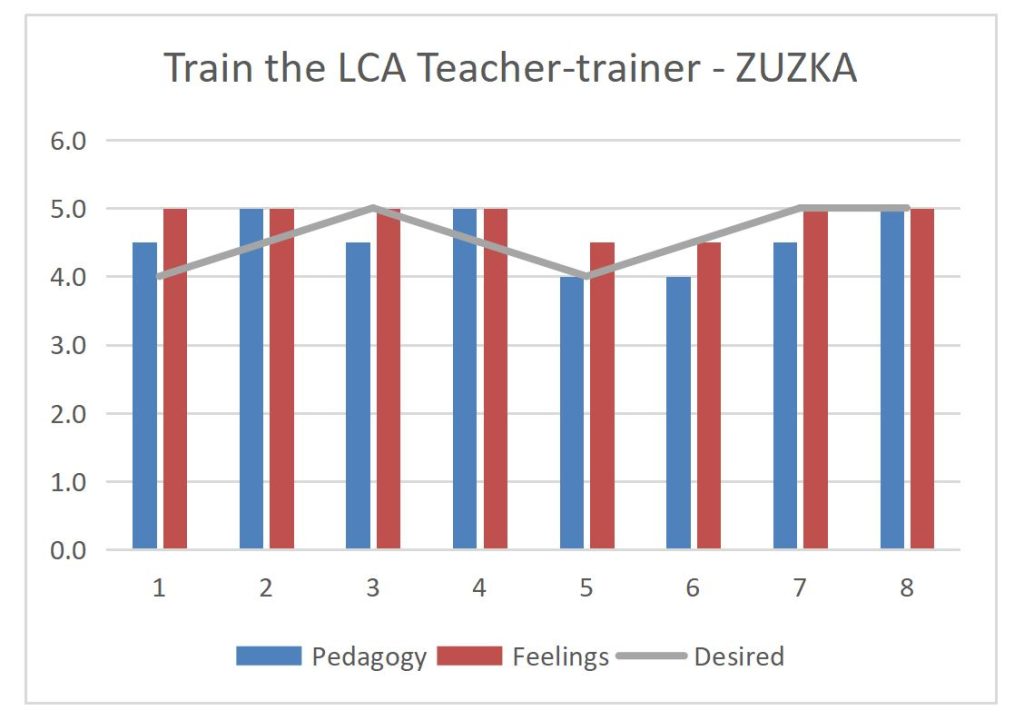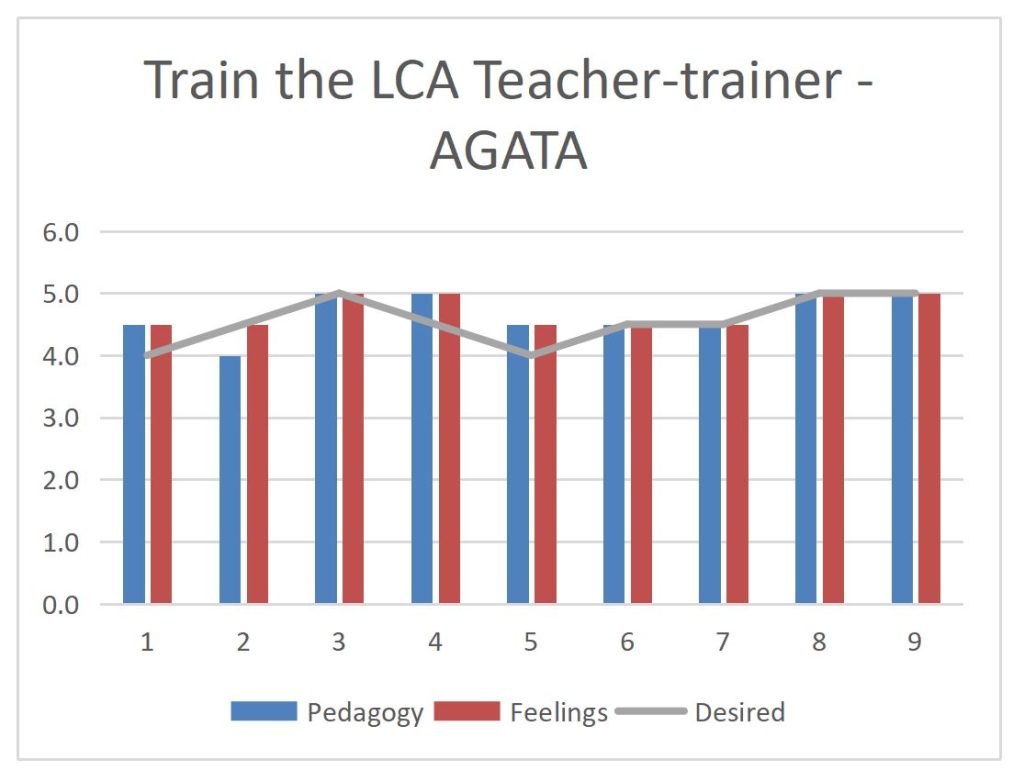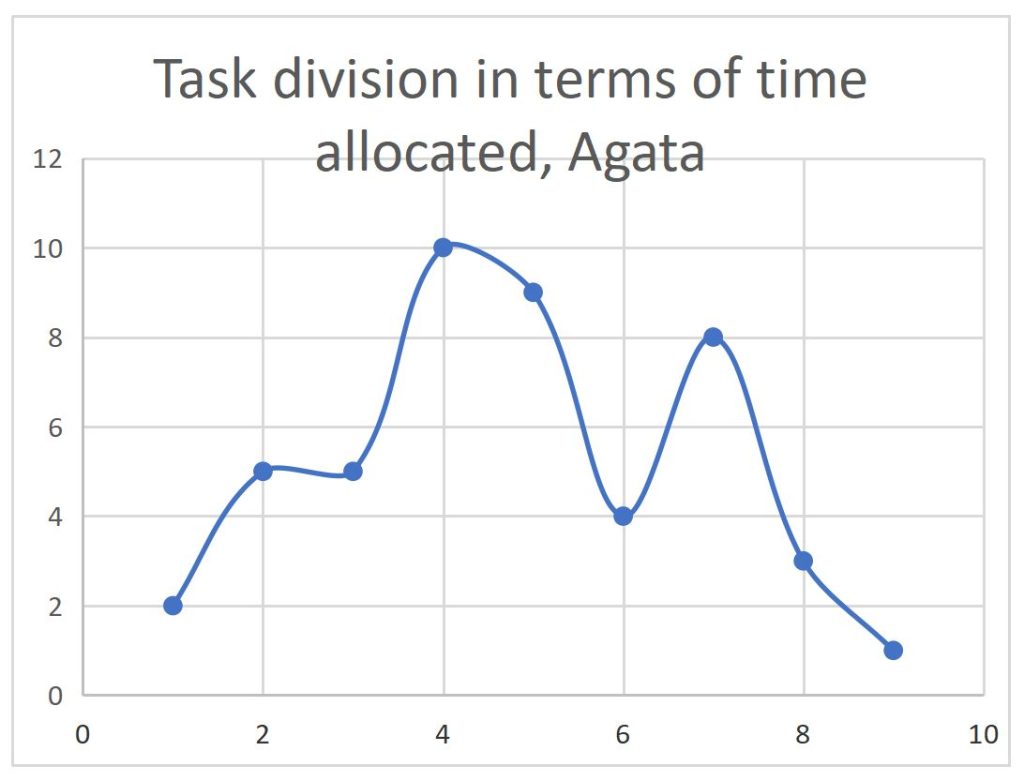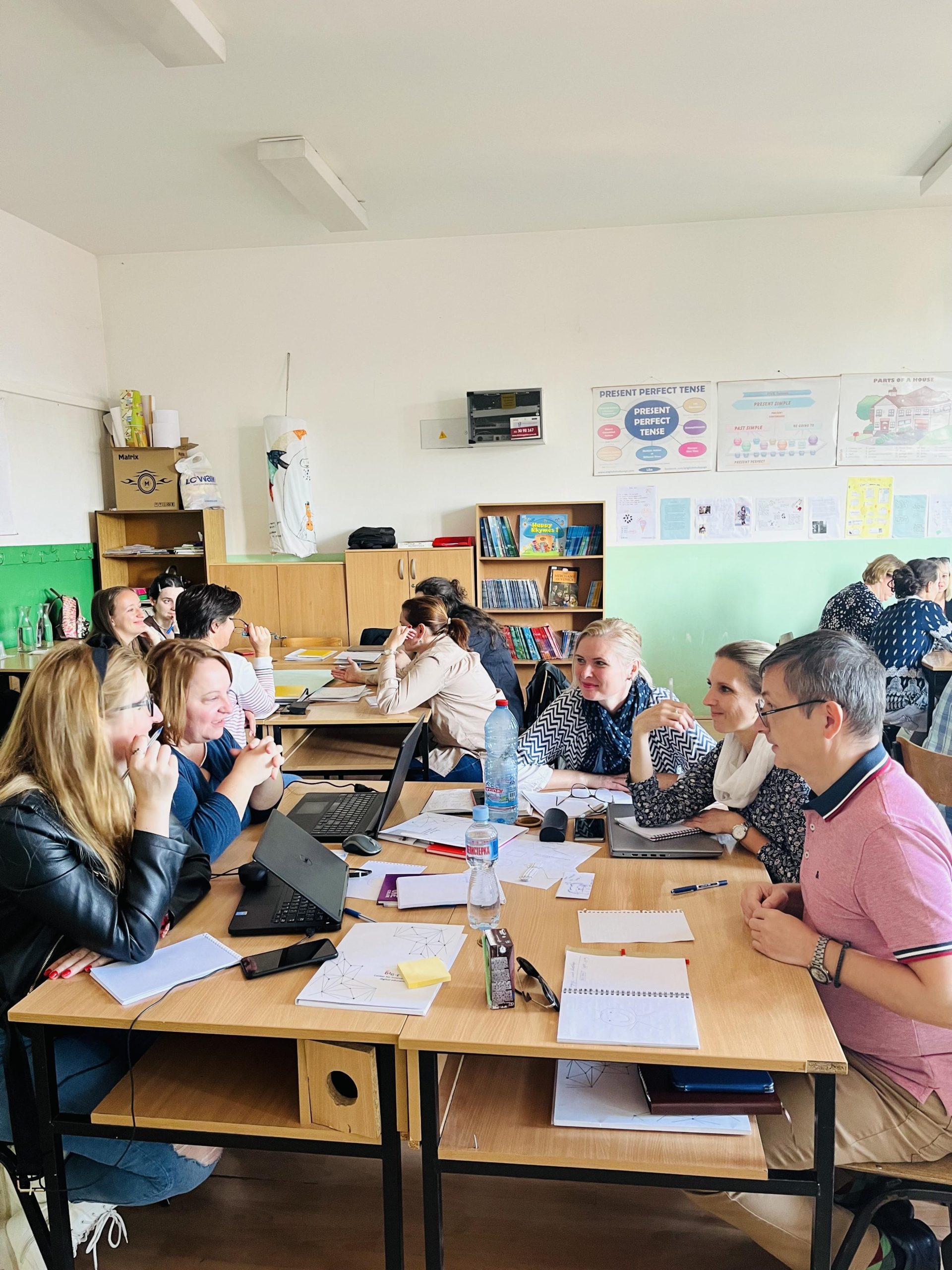My reflections on the “Train the LCA Teacher-trainer” training
Jana Chynoradská, Skopje, North Macedonia
It´s Saturday, 29th October 2022, the day after the first ever training on “Train the LCA Teacher-trainer” within the “Upgrade yourself with learner-centred approach” KA2 project which we launched back in September 2020. It is the last learning/teaching/training activity we had planned to be and so it was.
We all met on Sunday 23rd October 2022 in the small town of Negotino where the Strashno Pindjur Primary school has its residence. Despite a few difficulties we all got together well and experienced a week full of professional training led by experienced teachers coming from Slovenia, Macedonia, Lithuania, and Slovakia. Every day was full of new original training courses led by the LCA teacher-trainers-to-be, feedback given by the participants (google forms), by LCA observers working along with the elaborated LCA observation sheet and two LCA expert – assessors, me being one of them and Gabriela Lojova, the author of the 7 principles of LCA that forms the base for this project idea. What was by far the most important component of this teacher-training process was the self-reflection of the LCA teacher-trainer-to-to after s/he had heard all the feedback.
The training cycle for two LCA teacher-trainers-to-be was as follows:
09,00 – 10,00 Learning experience from the previous day
10,00 – 10,15 Coffee break
10,15 – 11,00 Training session delivered by the 1st LCA teacher-trainer-to-be
11,05 – 11,50 Training session delivered by the 2nd LCA teacher-trainer-to-be
11,50 – 12,05 Coffee break
12,05 – 13,05 Group feedback session (1. LCA teacher-trainer-to-be, 2. observers, 3.participants)
13,05 – 13,20 Individual feedback session: 1st LCA teacher-trainer-to-be with two LCA expert-assessors creating the Action plan for the 1st LCA teacher-trainer-to-be)
13,20 – 13,35 Individual feedback session: 2nd LCA teacher-trainer-to-be with two LCA expert-assessors creating the Action plan for the 2nd LCA teacher-trainer-to-be)
In the whole week there were 21 participants in person and 1 participant online. Out of these 12 got qualified as LCA teacher-trainer (one with recommendation after further developing their LCA teacher-training skills) and 2 were active as ULCA expert assessors.
If we take a closer look at the feedback provided by the participants, we can see that
1. 49,7% of the respondents came from Slovakia, 21,1% from Lithuania, 17,4% from North Macedonia and 11,8% from Slovenia.

2. The participants viewed that 58,4% of the LCA teacher-trainers-to-be delivered their session as excellent, 28,6% as very good and 13% as good.

3. The participants viewed that 60,2% of the LCA teacher-trainers-to-be overall approach as excellent, 27,3% as very good, 11,2% as good and 1,2% as poor.

4. In terms of the participants’ expectations, 38,5% were viewed as exceeded, 39,8% as fully met, 12,4% as met to a high extend and 9,3% as partly met.

5. The most crucial feedback from the participants was about their recommendation of the LCA teacher-trainer-to-be to become an LCA teacher-trainer and here the feedback is that 82,5% as “yes, sure”, 15,6% as “yes, in the future, after further developing their LCA teacher-training skills” and 1,9% as “no, I would recommend further study and training (LCA, Learn & Lead…) to become qualified for the LCA teacher-trainer.

There were always 2 LCA observers viewing one LCA teacher-trainer-to-be and they all follow the LCA observation sheet comprising of the key areas of a successful implementation of the LCA approach in the classroom. Namely, the following: 1. Active learning, learners ‘participation, 2. Learning content, 3. Balancing cognitive and affective domains, 4. Social climate and learning atmosphere, 5. Evaluation and feedback and 6. Teacher performance. This LCA observation sheet has 6 main areas of observation and each one then obtains more detailed description of expert teacher areas that help the observers view the session through the lens of the LCA approach. To name just one of them here is the detailed description of the 1. Active learning, learners ‘participation, T-teacher, Ls – learners
- Usage of methods supporting active learning and discovery
- Variation in methods, tasks, techniques, and learning activities
- Variation in organization / Ls grouping, blended learning
- Flexibility in pacing and timing
- T delegates tasks to Ls whenever possible ( hand out papers, peer answer)
- T distributes turns evenly among all Ls
- Ls participate in decision-making (grouping, suggesting activities, topics…)
- Ls express their own opinions, ideas, values
On top of that, each description is then observed and assessed in scale from 0 (not applied), through 1 (applied with difficulties), through 2 (applied sufficiently) to 3 (applied marvellously).
In terms of my feedback to each LCA teacher-trainer-to-be I used my own way of viewing, structuring, and measuring the trainer’s performance in the classroom.
- The first main table I call “Lesson analysis” and it consists of numbering the activities, measuring their start and end, grouping the Ls in the classroom, using “physical space”, CLIL, creativity in the session and the notes sections. It is presented in the excel spread sheet.
- The second table I offer is my own perception of the “pedagogical art performed by the teacher” and emotions present (here I do my best to feel the emotions of the group and mix them all together with mine). The maximum top is set to be 5 where there are a lot of positive vibes, smiles, deep learning happening in the classroom and 0 where the emotions seem to be frozen and all the people in the classroom seem to be in their own worlds.
- The last measurement I do in the assessment is the time allocated to the activities in the session. This is simply a curve noting the numbers (being the minutes devoted to individual activities in the classroom fully corresponding to the previous two measurements) and offering various shaped and feedback to look at the time spent and evaluate its efficiency and effectivity.
Here I offer you just two different LCA teacher-trainers and my view of their work in the classroom in line with the LCA and Learn & Lead philosophy our ULCA teacher-training qualification is based upon.




Once we gathered all the feedback for the LCA teacher-trainers-to be, we went through it all together as a learning community and then, each LCA teacher-trainer-to-be met Gabi Lojova and me, the ULCA expert assessors, and we all agreed on the Action plan for the following 6 months.
Each Action plan consists of the what to do, which LCA TDF (Learner-centred approach Teacher Development Framework) this action relates to, how to do it, why to do it, who will be monitoring this action with the LCA teacher-trainer-to-be, by when and how it will be checked. After a thorough personal analysis with 12 LCA teacher-trainers I must admit the outcomes exceeded my expectations and am more than happy to see what we all had created. There were at least 2 action plans outlined for each LCA teacher-trainer-to be, different ULCA professionals were chosen to monitor and support them in their actions, and we all have identified 28 action plans. To name just a few I insert the following:
| What | LCA TDF | How | Why | To whom | By when | Check |
| present the objectives of the session: | Active learning | say it in 1-2sentences | they know what to expect and set their minds for the session | Jana, Gabi | 27th October 2022 | Pilot LCA teacher-training session in January 2023, get it recorded and sent to Jana |
| improve my English communication, become more accurate | Teacher´s roles, relations with learners | use English abroad (USA), | be more intelligible | Mateja | by April 2023 | online meeting – speech monitoring |
| verbalize ideas in more concise and clear way | Guiding one´s further development | self-monitoring of my speech in the classroom, feedback from my students – anonymously | be more effective in teaching | Daniel | by April 2023 | observation in a classroom, specifically focus on this area |
| develop my IT competences | Guiding one´s further development | attend online course for ULCA teachers, we can share our knowledge, UNI course in Vilnius, experimenting in my lessons – one tech bit a lesson | it´s important to be at the same level as our students, be and feel more self-confident | Maja | Feb-May 2023 | make a list of the apps with a short explanation, reflect how often I use it a week/month |
| improve my language of instructions | Teacher´s roles, relations with learners | to be better organized | Zuzka | February 2023 | Zuzka observes specifically my lesson and will update my ULCA Action plan no.1 | |
| interconnectedness of the activities in the session | Learning content | connect my teaching real life experience with the LCA theory | get my SS to understand the connection between theory and practice/ applied LCA in the classroom | Jana | 10th November 2022 | Lesson plan and lesson delivery analysis of the lesson |
| advance my English communication skills | Teacher´s roles, relations with learners | take a course, do a lot of teacher-training in English, reading/listening/watching professional English | I want to be more self-confident in English | Jana/Gabi | monthly, 1st by 30th November 2022 | articles for the LLI NL |
| improve my English language skills | Teacher´s roles, relations with learners | attend English conversation classes, podcasts, diary… | to create better relationships with people, explore the world through English nowadays | Maťka | January 2023 | send Jana an email |
| Release stress/ Stress management | Resilience and stress management | attend a course of “Resilience” in LLI, reflect on the situations which I experienced as stressed and find out what caused it – can I learn from this? | it hurts me and I want to feel calm and think clearly | Katka/Jana | April 2023 | RQ test |
The following areas of development outlined in the LCA TDF were selected:
- Active learning, 3 actions
- Learning content, 2 actions
- Teacher´s roles, relations with learners, 10 actions
- Communication and co-operation with colleagues and school management, 2 actions
- Guiding one´s further development, 9 actions
- Resilience and stress management, 2 actions
As the LCA TDF is composed of two main parts, the Learner-centred and Learn & Lead, we can see that both of these were used in the LCA teacher-trainers-to-be action plans. To put it more precisely, here I sum it up as follows:
Learner-centred approach areas of development (15 actions)
- Active learning, 3 actions
- Learning content, 2 actions
- Teacher´s roles, relations with learners, 10 actions
Learn & Lead areas of development (13 actions)
- Communication and co-operation with colleagues and school management, 2 actions
- Guiding one´s further development, 9 actions
- Resilience and stress management, 2 actions
All in all, this week was a very special time spent with great friends, professionals and showed me the next course of action in my professional development. I am more than ready and willing to be supporting, guiding, and encouraging great, learner-centred teachers to step out and become LCA teacher-trainers in the future. My journey is now enriched with a lot of warm-hearted, authentic, original experiences which will stay in my heart for the rest of my life.
The LCA teacher-trainers-to-be, and we all managed to set up the foundation for the following “Train the LCA teacher-trainer” training courses for the future. If you are interested in becoming another LCA teacher-trainer, be ready to apply for our training in the summer 2023. Places, dates, and program to be announced before Christmas 2022.
Warmly yours,
Jana Chynoradska

Comments are closed